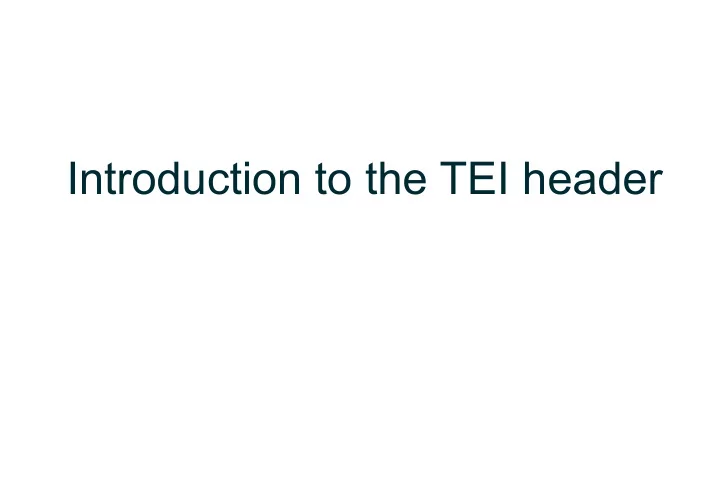

Introduction to the TEI header
What is the TEI header? The TEI header (<teiHeader>) is the ‘virtual 6tle page’ of a TEI document. It contains metadata (informa6on about the TEI document). <teiHeader> is the first, mandatory child element of the root <TEI> element; therefore, it appears at the top (‘at the head’) of every TEI document.
The header metadata provides: a bibliographic record of the electronic text as well as the source from which the electronic text is derived documenta6on of the encoding and editorial principles used in tagging the electronic text terms for indexing, searching, and retrieval a record of changes made to the electronic document
Structure of the header The header contains many specialised elements not found anywhere in the ‘body’ of a TEI document (that is, everything aGer the close of <teiHeader>). These elements allow for highly structured descrip6ons of the document. Many parts of the header allow free‐form prose descrip6ons as an alterna6ve to the highly structured descrip6ons. Few header elements are required, so a header can be quite minimal.
The four children of <teiHeader> 1. <fileDesc>: bibliographic info ( required ) 2. <encodingDesc>: descrip6on of encoding prac6ces ( op)onal ) 3. <profileDesc>: search terms ( op)onal ) 4. <revisionDesc>: record of changes ( op)onal )
The children of <fileDesc> <fileDesc>: bibliographic info ( required ) <6tleStmt> ( required ) <edi6onStmt> ( op)onal ) <extent> ( op)onal ) <publica6onStmt> ( required ) <seriesStmt> ( op)onal ) <notesStmt> ( op)onal ) <sourceDesc> ( required ) <encodingDesc>: descrip6on of encoding prac6ces ( op)onal ) <profileDesc>: search terms ( op)onal ) <revisionDesc>: record of changes ( op)onal ) http://www.tei-c.org/release/doc/tei-p5-doc/en/html/ref-fileDesc.html
The children of <fileDesc> <fileDesc>: bibliographic info ( required ) <6tleStmt> ( required ) <edi6onStmt> ( op)onal ) <extent> ( op)onal ) <publica6onStmt> ( required ) <seriesStmt> ( op)onal ) All other <notesStmt> ( op)onal ) elements describe descrip6on of the source <sourceDesc> ( required ) the TEI document <encodingDesc>: descrip6on of encoding prac6ces ( op)onal ) itself. <profileDesc>: search terms ( op)onal ) <revisionDesc>: record of changes ( op)onal )
The children of <fileDesc> <fileDesc>: bibliographic info ( required ) <6tleStmt> ( required ) <edi6onStmt> ( op)onal ) <extent> ( op)onal ) Only these three elements are required! <publica6onStmt> ( required ) <seriesStmt> ( op)onal ) All other <notesStmt> ( op)onal ) elements describe descrip6on of the source <sourceDesc> ( required ) the TEI document <encodingDesc>: descrip6on of encoding prac6ces ( op)onal ) itself. <profileDesc>: search terms ( op)onal ) <revisionDesc>: record of changes ( op)onal )
Children of <fileDesc> : <titleStmt> 6tle and info about those responsible for intellectual content of the TEI document ( required ) http://www.tei-c.org/release/doc/tei-p5-doc/en/html/ref-titleStmt.html
Children of <fileDesc> : <editionStmt> edi6on number or other descrip6on of the edi6on ( op)onal ) Examples from the TEI Guidelines: http://www.tei-c.org/release/doc/tei-p5-doc/en/html/ref-editionStmt.html
Children of <fileDesc>: <extent> size of the TEI document (in bytes, words, paragraphs, etc.) ( op)onal ) Example from the TEI Guidelines: http://www.tei-c.org/release/doc/tei-p5-doc/en/html/ref-extent.html
Children of <fileDesc> : <publica6onStmt> info about the publica6on and distribu6on of the TEI document ( required ) http://www.tei-c.org/release/doc/tei-p5-doc/en/html/ref-publicationStmt.html
Children of <fileDesc> : <seriesStmt> <notesStmt> <seriesStmt>: info about the series of which the TEI document is a part ( op)onal ) hWp://www.tei‐c.org/release/doc/tei‐p5‐doc/en/html/ref‐seriesStmt.html <notesStmt>: bibliographic notes (info that doesn’t fit elsewhere) ( op)onal ) hWp://www.tei‐c.org/release/doc/tei‐p5‐doc/en/html/ref‐notesStmt.html
Children of <fileDesc> : <sourceDesc> describes the source from which the TEI document was created. Can be: a short statement (‘This is a born‐digital document.’) a semi‐structured cita6on (as below) something as detailed as a <fileDesc>. (required) http://www.tei-c.org/release/doc/tei-p5-doc/en/html/ref-sourceDesc.html
< encodingDesc > ‘describes the rela6onship between an electronic text and its source or sources. It allows for detailed descrip6on of whether (or how) the text was normalized during transcrip6on, how the encoder resolved ambigui6es in the source, what levels of encoding or analysis were applied, and similar maWers’ (from the TEI Guidelines) Can contain a prose descrip6on or use up to seven specialised child elements … http://www.tei-c.org/release/doc/tei-p5-doc/en/html/ref-encodingDesc.html
Children of <encodingDesc> (1) <projectDesc> describes the overall project purpose and process hWp://www.tei‐c.org/release/doc/tei‐p5‐doc/en/html/ref‐projectDesc.html <samplingDecl> documents ra6onale for text sampling or selec6on in case parts of text or corpus have been omiWed hWp://www.tei‐c.org/release/doc/tei‐p5‐doc/en/html/ref‐samplingDecl.html
Children of <encodingDesc> (2) <editorialDecl> explains editorial principles of encoding or transcribing texts. Can contain a prose descrip6on or use up to seven specialised child elements to describe: correc6ons or normalisa6on performed during the transcrip6on handling of quota6on marks and hyphena6on any standardisa6on of dates or numbers performed analy6c or interpre6ve informa6on added to the text http://www.tei-c.org/release/doc/tei-p5-doc/en/html/ref-editorialDecl.html
Children of <encodingDesc> (3) <tagsDecl> records how tags are used and how their content should be displayed by default hWp://www.tei‐c.org/release/doc/tei‐p5‐doc/en/html/ref‐tagsDecl.html <refsDecl> specifies how canonical references are constructed in the TEI document hWp://www.tei‐c.org/release/doc/tei‐p5‐doc/en/html//ref‐refsDecl.html <classDecl> gives informa6on about any systems for classifica6on used in the TEI document hWp://www.tei‐c.org/release/doc/tei‐p5‐doc/en/html/ref‐classDecl.html <appInfo> can be used to record informa6on about programs which have acted upon the TEI document hWp://www.tei‐c.org/release/doc/tei‐p5‐doc/en/html/ref‐appInfo.html
<profileDesc> contains ‘classificatory and contextual informa6on about the text, such as its subject maWer, the situa6on in which it was produced, the individuals described by or par6cipa6ng in producing it, and so forth. Such a text profile is of par6cular use in highly structured composite texts such as corpora or language collec6ons, where it is oGen highly desirable to enforce a controlled descrip6ve vocabulary or to perform retrievals from a body of text in terms of text type or origin. The text profile may however be of use in any form of automa6c text processing’ (from the TEI Guidelines) Can contain a number of specialised child elements … http://www.tei-c.org/release/doc/tei-p5-doc/en/html/ref-profileDesc.html
Recommend
More recommend